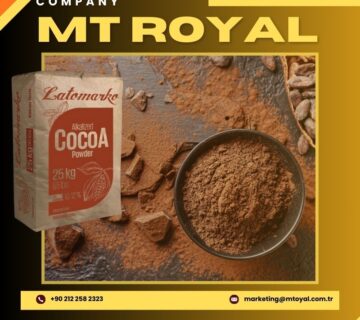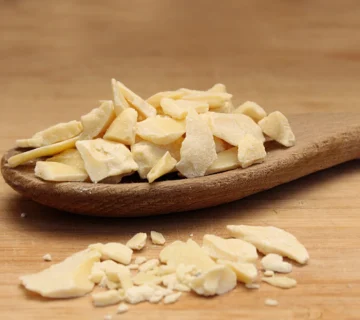For bakery operations in Palestine, cocoa is more than a flavoring—it’s a cornerstone of product identity. Whether in chocolate cakes, brownies, cookies, or ganache fillings, the type and quality of cocoa powder define both the sensory experience and operational efficiency. Among available options, alkalized cocoa powder has become a preferred choice for many industrial bakeries due to its smooth flavor profile, rich color, and versatility in formulation.
The rise in demand for high-quality baked goods has made consistent sourcing a critical factor. Factory owners and production supervisors know that ingredient variability can compromise batch quality, machine performance, and ultimately customer satisfaction. That’s why understanding the characteristics, sourcing strategies, and industrial applications of alkalized cocoa powder is vital.
At MT Royal, we supply Palestinian bakeries with carefully selected cocoa powders, ensuring consistency, competitive pricing, and compliance with international quality standards. In our experience, partnering with reliable suppliers significantly reduces downtime and enhances product quality, creating a strong foundation for bakery innovation and growth.
Understanding Alkalized Cocoa Powder
Alkalized cocoa powder, often called Dutched cocoa, undergoes a chemical treatment with an alkalizing agent, such as potassium carbonate. This process neutralizes acidity in natural cocoa, altering its color, flavor, and solubility.
Key attributes include:
- Mellow flavor profile: Less bitter than natural cocoa, making it ideal for mass-market baked goods.
- Darker, richer color: Enhances visual appeal, especially in chocolate cakes, cookies, and glazes.
- Improved solubility: Easier integration into batters, doughs, and ganache.
- pH stability: Compatible with leavening agents, ensuring consistent rise and texture.
For bakery production, these characteristics are not just technical—they impact customer perception. A darker, uniform cake crumb or a smooth chocolate frosting can elevate the product from ordinary to premium.
The Benefits of Alkalized Cocoa Powder for Industrial Bakeries
Palestinian bakeries, from medium-sized production plants to large-scale factories, experience several unique advantages by using alkalized cocoa powder:
- Consistent Color and Taste
Batch-to-batch variation is a common issue with natural cocoa. Alkalized cocoa ensures uniform color and a predictable flavor profile, simplifying recipe scaling and quality control. - Compatibility with Leavening Agents
Alkalized cocoa’s neutral pH allows it to work seamlessly with baking soda, producing a consistent crumb texture and avoiding unwanted chemical reactions that could affect volume or flavor. - Enhanced Shelf Life
The alkalization process can reduce acidity and improve oxidative stability, which contributes to longer shelf life for finished baked products. - Operational Efficiency
Its solubility and flowability reduce production clogs, prevent uneven mixing, and minimize downtime on industrial mixers and enrobing lines. - Flexibility Across Applications
Alkalized cocoa powder is versatile: it can be used in doughs, fillings, frostings, chocolate coatings, and even beverages, making it a one-stop solution for bakery product lines.
Common Pitfalls in Sourcing Alkalized Cocoa Powder
Despite its benefits, procurement of alkalized cocoa powder can be challenging. Based on our experience at MT Royal, several recurring pitfalls emerge:
- Inconsistent processing standards: Not all suppliers maintain uniform alkalization, leading to flavor or color variability.
- Moisture sensitivity: Cocoa powder can absorb humidity, clumping in storage and affecting flow through industrial equipment.
- Unverified origin: Traceability is essential for regulatory compliance and quality assurance.
- Price-focused buying: Cheaper powders may contain fillers or lower cocoa solids, compromising finished product quality.
Avoiding these pitfalls requires careful supplier selection, batch testing, and proper storage management. MT Royal’s sourcing network offers access to trusted brands, including Latamarko, ensuring both quality and operational reliability.
Technical Specifications for Industrial Use
Factory managers must pay attention to technical parameters when selecting alkalized cocoa powder:
| Parameter | Typical Industrial Range | Impact on Bakery Production |
|---|---|---|
| Cocoa Solids | 20–24% | Determines flavor intensity and color depth |
| pH Level | 7.0–8.0 | Ensures compatibility with baking soda |
| Fat Content | 10–12% | Affects moisture retention and texture |
| Particle Size | ≤ 20 microns | Prevents lumps and ensures smooth batters |
| Moisture | < 5% | Reduces clumping and microbial risk |
| Color | Dark brown | Visual appeal and consistency in finished goods |
Premium European-origin powders, such as Latamarko, are recognized for exceptional consistency in these parameters, providing bakery operators with confidence in both product and process.
Industrial Applications in Palestinian Bakeries
Alkalized cocoa powder finds applications across multiple bakery products:
- Chocolate Cakes and Muffins: Ensures uniform crumb and vibrant color.
- Cookies and Biscuits: Improves dough flow, browning, and flavor depth.
- Fillings and Frostings: Smooth texture and rich chocolate taste.
- Ganache and Coatings: Blends easily with fats for glossy finishes.
- Beverages and Mixes: Dissolves efficiently for instant chocolate drinks or powders.
For production managers, the ability to use a single ingredient across multiple applications simplifies inventory management and reduces complexity in purchasing and storage.
Storage and Handling Best Practices
Cocoa powder is hygroscopic, meaning it readily absorbs moisture. Proper storage is essential for maintaining quality:
- Temperature: 18–22°C
- Humidity: <60% relative humidity
- Containers: Sealed, airtight bags or bins
- FIFO Principle: First In, First Out to maintain freshness
Failure to follow these practices can lead to clumping, uneven mixing, or microbial contamination — all of which compromise production efficiency and product quality.
Procurement Strategy for Palestinian Bakeries
Effective sourcing of alkalized cocoa powder goes beyond price comparison. Factory managers should consider:
- Supplier Reputation: Reliability, quality assurance, and delivery consistency.
- Batch Consistency: Uniform pH, color, and cocoa solids content.
- Logistics Efficiency: Timely deliveries and temperature-controlled transport.
- Regulatory Compliance: Traceability certificates, food safety documentation.
- Brand Selection: Access to premium options like Latamarko ensures top-tier product lines.
At MT Royal, we guide bakeries in structuring procurement contracts that balance cost, reliability, and quality — mitigating the risk of ingredient-induced production delays.
Comparison: Standard vs. Premium Cocoa Powder
| Feature | Standard Industrial Cocoa | Premium (e.g., Latamarko) |
|---|---|---|
| pH Stability | Moderate | Highly consistent |
| Color Uniformity | Variable | Exceptional |
| Flavor Intensity | Average | Rich, smooth, and balanced |
| Particle Size Control | Broad range | Strict ≤ 20 microns |
| Moisture Tolerance | Moderate | Optimized for storage |
| Price | Lower | Higher, justified by performance |
For bakeries producing mass-market products, standard industrial cocoa may suffice. Premium brands, however, offer predictable performance for artisan and high-end lines, justifying the investment through fewer rejects, consistent texture, and enhanced sensory quality.
Practical Tips for Production Supervisors
- Pilot Batches: Test each new cocoa powder batch in small-scale production before full integration.
- Blend Strategically: Mix standard and premium powders for a balance of cost and quality.
- Monitor Flowability: Ensure hoppers, mixers, and dosing equipment handle the powder consistently.
- Implement Strict Storage Protocols: Maintain temperature and humidity control for optimal powder integrity.
- Engage Suppliers for Technical Support: MT Royal and Latamarko provide guidance on formulation adjustments and process optimization.
These steps reduce production variability, minimize waste, and ensure the final baked goods meet brand expectations.
Frequently Asked Questions
Q1: Can alkalized cocoa powder be used with natural leavening agents?
Yes, but the reaction differs from baking soda. Testing is recommended to maintain crumb texture.
Q2: How does alkalized cocoa affect cake color?
It produces a darker, more uniform brown crumb, enhancing visual appeal.
Q3: Does premium cocoa powder justify higher costs?
For consistent texture, flavor, and color in large-scale production, yes — fewer rejects and more reliable batches offset the price difference.
Q4: How long can cocoa powder be stored?
Up to 12–18 months if stored under optimal conditions (cool, dry, sealed).
Q5: Why choose MT Royal as a supplier?
We provide a comprehensive range of brands, including Latamarko, with consistent quality, competitive pricing, and technical support for Palestinian bakeries.
latamarko alkalized cocoa powder lm60
cocoa powder for chocolate production-Best price
Food industry raw materials – list of products
Types of Gelatin from Turkish Manufacturer
Alkalized Cocoa Powder Bulk Supplier







No comment